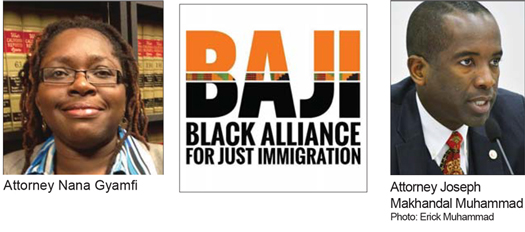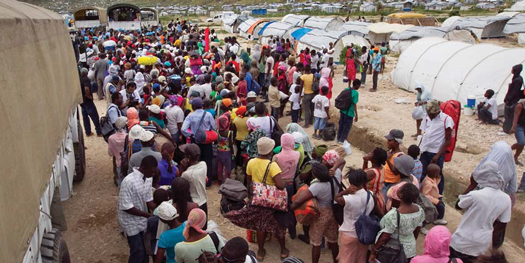By Charlene Muhammad CHARLENEM

LOS ANGELES – Blacks are absent from the narrative about executive orders, chilling raids, and deportations, say advocates who have increased efforts to help Black immigrants survive in America’s ugly political climate.
They say Blacks are suffering more from everything, including criminalization under expanded police authority.
“They’re not really paying much attention to us,” said Albert Saint Jean, an organizer with New York City’s Black Alliance for Just Immigration.
“That’s because Black immigrants tend to live in communities that are over policed and targeted for the prison industrial complex,” he said.
Another reason they’re not being talked about is America has a tendency to portray Blacks as one big homogenous group, but by doing so, they create a divide, he said.
“Therefore, many Black people feel, meaning our African American brothers and sisters, feel as they have no stake in the immigration issue, wherein we do, because we’re a very diverse community,” said Mr. Saint Jean.
Black immigrants make up about five to seven percent, a little over half a million undocumented immigrants in the U.S., but they’re 21 percent of criminal deportations, according to Mr. Saint Jean.
Current statistics say about 3.8 million to 4 million Black immigrants are in the U.S., but the numbers could be higher, stated Mr. Saint Jean.
Some studies suggest there are as many as five million Black immigrants in the U.S., however, analysis of the 2014 American Community Survey data, tallies a record estimate of 3.7 million Black immigrants living in the U.S., according to a study on the state of Black immigrants by Black Alliance for Just Immigration and the New York University Law Immigrant Rights Clinic.

The country can help Blacks and Latinos by ending over-policing and “broken windows” policing which unfairly targets people of color in both communities; ending the prison industrial complex; passing things like DACA (Deferred Action for Childhood Arrivals) and the Dream Act; as well as making the path to citizenship easier for many living in the shadows in America, Mr. Saint John said.The Black Alliance and other organizations, like Justice Warriors for Black Lives–a collaborative effort of attorneys, legal workers and non-legal workers which provides workshops, training, policy development, and legal services in support of current Black liberation efforts–works “know your rights” community meetings, legal clinics, compiling street teams for rapid response for legal aid and other resources.
“The issues that face Black immigrants are not being raised. Space is not being made to include the Black immigrant. And so, as usual, it is on us to do for ourselves, to do for self, and to look at what are the issues that we face,” said Attorney Nana Gyamfi.
Those issues may be different than the issues that are being faced by Mexican immigrants because so much of what people talk about in terms of policy reforms, and who is being helped, is focused on that population, she said.
Atty. Gyamfi expressed disappointment over recent “Day Without Immigrants” protests which she said excluded Black immigrants.
It’s “just symptomatic of the deeper issue of anti-Blackness that leads to Black immigrants not being able to rely upon these various non-Black immigrant groups to speak up for, to cover the concerns of Black immigrants,” Atty. Gyamfi told The Final Call.
Likewise, conversations about the Muslim ban focused on the most privileged, for instance Iranian doctors and the more wealthy, she argued. “Of course, we’re not saying they should be banned, but that’s where the focus is, not on the most vulnerable people who were the Sudanese and Somali refugees,” Atty. Gyamfi stated.
“People will go to the airport by the tens of thousands across the country, saying, ‘Let them in! Let them in!’ talking about this one group of people, but they’re not saying that about the Haitians, who certainly need more help and are way more vulnerable,” she argued.
Attorney Joseph Makhandal Muhammad, former mayor of the Borough of South Toms River, in Ocean County, N.J., is Haitian representative for the Honorable Minister Louis Farrakhan and the Nation of Islam. Some 4,000 Haitian refugees are suffering, he said.
Likewise, he said he hasn’t noticed in politicians or others the same fervor or vigor for Black refugees as he has seen for those coming from the Middle East, Yemen, and throughout the world.
That’s because the cultural, racial make-up of those individuals are either White, Arab, or mixed, Mr. Muhammad said.
“Just to put it in proper context, the Haitians have succumbed or have experienced one of the worst environmental disasters that have ever been recorded in recent history, in which 300,000 people died as a result of an earthquake on Jan. 12, 2010,” he said.
People are fleeing the country because of economic and social conditions as well as political issues and received temporary protective status, but for a very short time, he said. Every 18, months President Barack Obama extended the status, but now, there’s major concern as to whether or not the Trump administration will extend the status, which will expire on July 22, 2017, Mr. Muhammad said.
Even after Hurricane Matthew hit in Oct. 2016 and during last year’s election season, while championing the cause of refugees, the Obama administration secretly was deporting Haitians who had just arrived in San Diego, California, coming from Brazil, he said.
Many have died, and numbers keep rising, he stated. At last check, the toll was close to 200, but it could be way higher, he told The Final Call.
“People died from lack of water, because it takes about three to four months to walk through 11 countries, 7,000 miles,” Mr. Muhammad stated. “And the world doesn’t know anything about it. It’s not in the mainstream media. They’re not talking about this, and that is really disconcerting,” he said.
“Haitians are Black and they are poor and so they are considered as those invisible immigrants, or the invisible refugees, so nothing was mentioned of them,” said Mr. Muhammad, who is also an immigration lawyer.
He hears countless stories of families’ misery and suffering during travel. People have died from hunger and thirst, been attacked by bandits at gunpoint, raped, drowned while crossing the river, particularly in Nicaragua, died while imprisoned, and some died in forests due to snakes and flesh eating plants, said Atty. Muhammad.
To date U.S. Immigration and Customs Enforcement has deported over 130 Haitians who were at the Mexican border, particularly men, he said.
“We know it’s happening in Syria, in Yemen, but right here in Mexico. There was a time during the campaign, while Obama and Clinton was presenting themselves as different from Trump and how they’re so in love with refugees, they made a call secretly, when they heard 1,000 people were on their way to come to California, and they told them to return back to Brazil, because once they arrive in the United States, they will be deported,” Mr. Muhammad said.
He suggested providing shelter, parole with admission into the U.S. to apply for employment authorization cards, and to processing Haitians to understand any fear of prosecution.
“If it’s not that, give them a chance to remain in the United States under temporary protective status, because Haiti has been going through so much environmental disasters that has rendered the living condition of those people unbearable, nearly impossible, so to send those people back into that mess is not human at all. It’s not human,” he said.












